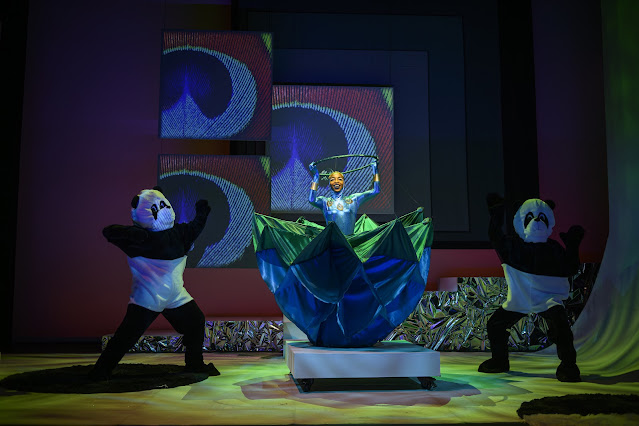 |
| Handel: Alcina – Yolisa Ngwexana (Morgana) – Guildhall School (Photo: David Monteith-Hodge) |
Handel: Alcina; Georgie Malcolm, Yolisa Ngwexana, Samantha Hargreaves, Shana Moron-Caravel, Julia Merino, Jonah Halton, Alaric Green, director: John Ramster, conductor: James Henshaw; Guildhall School of Music and Drama
Reviewed 5 June 2024
Handel’s sorceress gets a very modern take-over in this imaginative production full of engaging and impressive performances from the young singers and instrumentalists
The story Alcina continues to resonate with modern audiences because the heroine, building on a standard trope of the Baroque era of the wicked sorceress caught in her own toils and falling in love, is a remarkably three-dimensional modern character. Fallible and believable, Alcina combines danger, glamour with deep feeling, she is very much a cousin of the modern ‘tart with a heart’ and part of the opera’s success is the way Handel evinces sympathy for her
Handel’s opera provides a wealth of possibilities for directors using her magic as some sort of metaphor with recent productions highlighting glamour and celebrity [at Covent Garden, see my review or at Opera North, see my review], or the theatre itself [at Glyndebourne, see my review]. For the new production of the opera at Guildhall School of Music and Drama, John Ramster and designer Louis Carver chose to leave the metaphor to us, instead their Alcina was a sorceress commanding a very modern sort of magic allied to a performance which saw Guildhall School students sitting side-by-side with members of the Academy of Ancient Music in the pit.
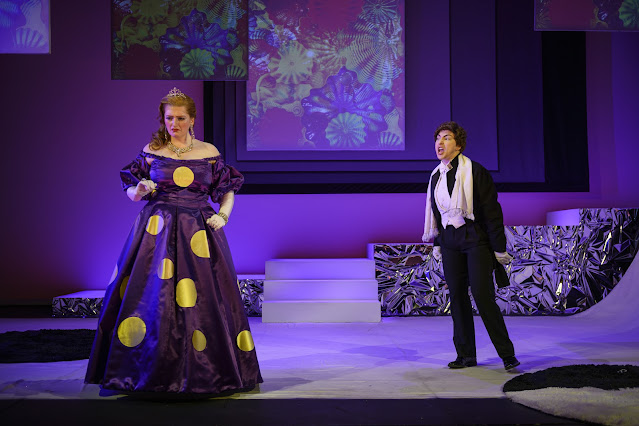 |
| Handel: Alcina – Georgie Malcolm (Alcina), Shana Moron-Caravel (Ruggiero) – Guildhall School (Photo: David Monteith-Hodge) |
We caught the second performance of John Ramster‘s production of Handel’s Alcina given by the Guildhall School at Milton Court Theatre on 5 June 2023. Designs were by Louis Carver with lighting by Andy Purves and video by Jonathan Strutt. Georgie Malcolm was Alcina, Yolisa Ngwexana was Morgana, Samantha Hargreaves was Oberto, Shana Moron-Caravel was Ruggiero, Julia Merino was Bradamante, Jonah Halton as Oronte, Alaric Green was Melisso and Harun Tekin was Astolfo. The conductor was James Henshaw and the orchestra featured members of the Academy of Ancient Music as section leaders alongside the Guildhall Opera Orchestra.
But despite the period manners in the orchestra and period style from the singers, this was a very modern production. Ramster and Carvel’s designs were pure 21st century (or perhaps 20th century fantasy). And the forces used were not those Handel would have expected. The scale was different, for a start. The orchestra was significantly smaller than those typically used by Handel for his operas (a common feature of the economics of modern performance), but more significantly this performance had no chorus and no dance troupe, choruses and dances were done by the soloists themselves.
Beyond the challenges of singing Handel, this was a very technically challenging production for the singers. Both Georgie Malcolm as Alcina and Yolisa Ngwexana as Morgana had a different outfit for each aria/scene, leading to some very quick changes indeed. And the cast all doubled as black clad, masked dancers portraying Alcina’s victims, yet more quick changes, whilst all had to dance and sing the choruses. And all came through brilliantly. Whatever you thought of Ramster’s dramatic concept for the production (and there was certainly much to enjoy), this was a brilliant training exercise for the singers.
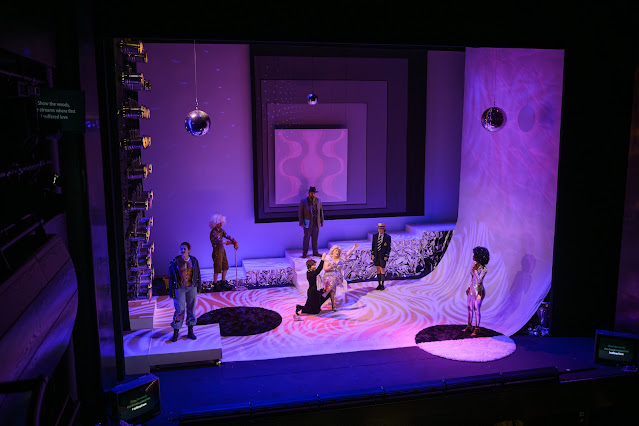 |
| Handel: Alcina – Guildhall School (Photo: David Monteith-Hodge) |
Carver’s set had something of a 1970s TV spectacular about it, abstract and rather tacky. Overlaying this was the use of screens projecting Jonathan Strutt’s videos. Strutt is a third-year student on Guildhall School’s Production Arts course. The videos reflected the emotional atmosphere of the drama, so in Act One all was vivid and again rather 1970s, whilst in Act Two the colour palate drained and often reflected the realism that Ruggiero comes back to after Melisso’s intervention. This continued into Act Three as Alcina’s powers waned. There were, however, puzzling elements to the production, the dancing pandas for one, and the suicidal giant teddy bear that rather pulled focus from Alcina’s ‘Ah! mio cor’.
At the start of the overture, the orchestra seemed to take a little time to settle down, and there was a sense throughout the opera that Henshaw’s tempos could be rather unforgiving and that he was not always allowing space for the performers. The orchestral playing settled down nicely, but there were moments of disagreement between stage and pit during ensembles, and Henshaw seemed somewhat inclined to be rigid, not allowing singers time, Shana Moron-Caravel suffered at one point because of this. And occasionally singers fell foul of his fast tempos, so that in Bradamate’s second act aria, ‘Vorrei vendicarmi’, the speed was rather unforgiving and Julia Merino’s passage work suffered.
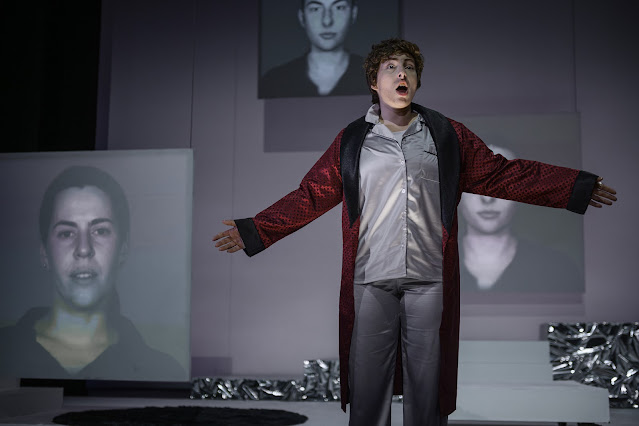 |
| Handel: Alcina – Shana Moron-Caravel (Ruggiero) – Guildhall School (Photo: David Monteith-Hodge) |
Georgie Malcolm made a poised Alcina, her voice bringing a rich warmth to her performance along with some lovely creamy tone. She was at her best in the most lyrical moments, but successfully held our attention for the entire opera. This Alcina was most definitely queen of all she surveyed. Not all her costumes were, I thought, helpful but Malcolm impressed throughout and in the great scene at the end of Act Two when her powers fail, she pulled no punches. This was as fine a role debut as one could expect, and I look forward to seeing what she does next.
As Morgana, Yolisa Ngwexana displayed a different style of voice, thankfully providing a nice contrast with Malcolm. Ngwexana brought out the soubrette side of Morgana, whilst dazzling with the coloratura. Her number at the end of Act One did indeed dazzle musically as well as visually, but throughout Ngwexana gave a delightful account of Morgana’s changeable nature. Yet, at the opening of Act Three she was well able to move into more emotional territory for the crucial scene with Jonah Halton’s Oronote, a moment that is often shirked in modern productions but here resonated strongly (and Ngwexana ‘s costume reflected the emotional stress she was in).
Shana Moron-Caravel made a striking Ruggiero, for the first act or so she successfully brought out the love-drunk nature of Ruggiero’s devotion to Alcina. Moron-Caravel does not have the most heroic of physiques, she is quite petite, yet vocally she packed a real punch, whether lyrically as in ‘Verdi prati’ or dazzling in her showpiece, ‘Sta nell ircana’ with its taxing high horn parts. This was an intelligent account of a tricky role, and Moron-Caravel’s approach brought some nice modern touches to Ruggiero’s emotional journey. As with the rest of the production, it was clear that these characters were modern young people.
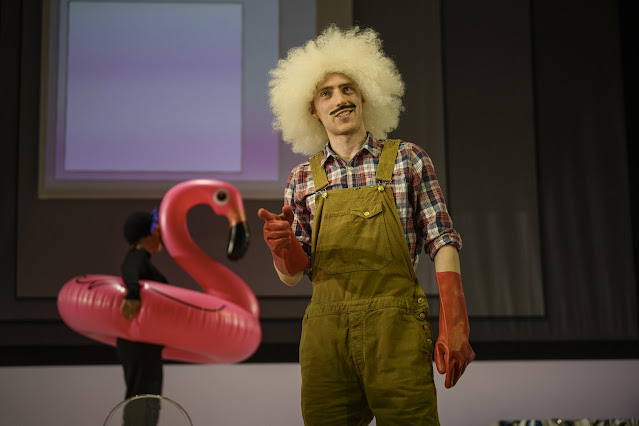 |
| Handel: Alcina – Jonah Halton (Oronte) – Guildhall School (Photo: David Monteith-Hodge) |
I loved the way Ramster and Julia Merino had developed Bradamante’s portrayal of her brother, Ricciardo, including the character’s difficulty at having an emotional and intimate connection to Ngwexana’s Morgana. This introduced an element of humour to these early scene which was understandable and believable, but I have to confess that the idea of opera seria still needing to be leavened with humour is an unwelcome one. Throughout the evening, Merino brought out the way Bradamante was uncomfortable with the situation and when Ruggiero had been retrieved, Merino and Moron-Caravel made it clear that this was no simple happy end.
Jonah Halton’s Oronte was the janitor, constantly mopping floors and blessed with a rather hideous wig. Oronte is a relatively unnecessary character, as in other Handel dramatic works, he’s there because Morgana needs a love interest to dump. But Halton’s grasp of bel canto and his way with elaborate passagework was quite simply a sheer joy. His arias were a thing of expressive beauty, and I can’t wait to hear him in a more dramatically challenging bel canto role.
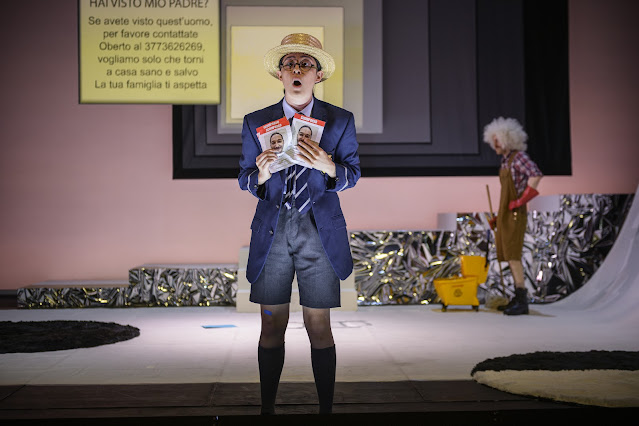 |
| Handel: Alcina – Samantha Hargreaves (Oberto), Jonah Halton (Oronte) – Guildhall School (Photo: David Monteith-Hodge) |
The role of the boy Oberto was introduced by Handel and his librettist as a showcase for ‘the boy’ (William Savage). His arias are incidental to the plot, but Samantha Hargreaves’ engaging Oberto was a delightful and constant presence on stage and Hargreaves gave fine account of his arias whilst giving her character a suitably boyish air.
Alaric Green impressed as Melisso, singing his aria with confident swagger and throughout making the character’s pronouncement impressive and sometimes amusing too. He made much of little.
The performing of a whole Handel opera side-by-side with professional players in historically informed style is a new thing for Guildhall School, and whilst there were elements that still needed to settle, overall this was a terrific achievement. It is worthwhile remembering that the players had a considerable amount of ground to cover, we had over two and a half hours of music.
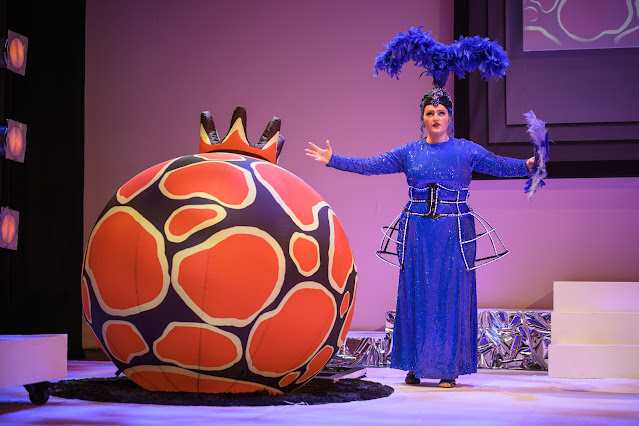 |
| Handel: Alcina – Georgie Malcolm (Alcina) – Guildhall School (Photo: David Monteith-Hodge) |
The whole evening was a significant achievement. Ramster’s production and Carver’s designs combined a thoughtful concept with a nicely playful element, and we never strayed far from the original libretto either. The young singers all brought a strong sense of character to their roles as well as not a little style when it came to the music. Opera seria is not the easiest of genres, and here we were captivated. In the pit, Henshaw and his team gave us plenty to enjoy too.
Never miss out on future posts by following us
The blog is free, but I’d be delighted if you were to show your appreciation by buying me a coffee.
Elsewhere on this blog
- Sensitive solo performances, youth choirs and with a rediscovery of the original orchestral sound: Elgar’s The Dream of Gerontius from Gabrieli, Paul McCreesh, Nicky Spence – record review
- Taking the woman’s side: Poulenc’s La voix humaine and Fiançailles pour rire from Paula Sides and Sergey Rybin – record review
- An Evening of Don Juan: SongEasel’s imaginative programme certainly brings song to South East London in vivid performances from Ella Taylor and Jocelyn Freeman – concert review
- Back to the 1960s: Opera Holland Park returns to its 2008 production of Tosca and creates a satisfying evening in the theatre – opera review
- Telling a story: Solomon’s Knot in stylishly vivid form for the Canon’s version of Handel’s Esther – concert review
- Doing Vivaldi proud: his Olympic opera performed with verve & imagination by Irish National Opera – opera review
- Creating something remarkable: Fatma Said & Joseph Middleton in Mozart, Schubert, Schumann, de Falla, Obradors & Hankash – concert review
- Thomas Roseingrave: Eight Harpsichord Suites and other keyboard works – record review
- International Handel Festival, Göttingen
- Combining disparate sounds with a bit of magic: Michel Godard and serpent in Göttingen – concert review
- Göttingen 1853: Johannes Brahms & Joseph Joachim, a meeting of musical minds evoked – concert review
- Quite a Summer: Tom Fetherstonhaugh and Fantasia Orchestra have three festival debuts including the BBC Proms – interview
- Home


-DavidMonteith-Hodge-Photographisepleasecredit-Alcina2-(DMH_9148).jpg?w=998&resize=998,665&ssl=1)







